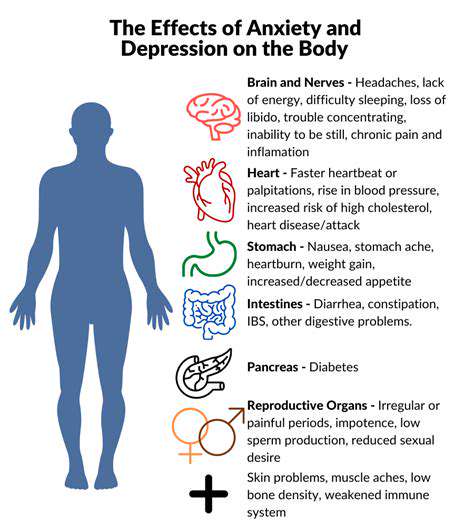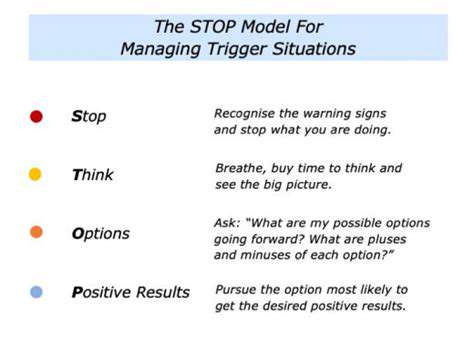Exploring Somatic Symptoms of Anxiety: What to Look For
Beyond the Typical Anxiety Symptoms
Anxiety isn't just about racing thoughts or a pounding heart—it can creep into your body in ways you might not expect. While most folks recognize the classic signs like shaky hands or trouble focusing, there's a whole spectrum of physical symptoms that fly under the radar. These sneaky manifestations often get brushed aside, leaving people struggling without proper answers or relief. Whether you're dealing with anxiety yourself or working in healthcare, spotting these less obvious clues can make all the difference in getting the right help.
Digestive Issues and Anxiety
Ever noticed how your stomach acts up when you're stressed? That's no coincidence. Anxiety can wreak havoc on your gut, leading to anything from constant stomachaches to unpredictable bathroom trips. The brain-gut connection runs deep—when your mind's in overdrive, your digestive system often pays the price. For many people, tackling the root anxiety brings more relief than antacids ever could.
Chronic bloating, heartburn, or even full-blown IBS might actually be your body's way of signaling unresolved stress. Learning to read these signs can be a game-changer for your comfort and health.
Musculoskeletal Pain and Tension
Your muscles might be holding onto stress more than you realize. That persistent ache in your neck or shoulders? The headaches that won't quit? These could be physical echoes of anxiety. Over time, this constant tension can snowball into chronic pain conditions. The good news? Approaches like therapy, mindfulness, or targeted medications can help loosen both your mind and those knotted muscles.
Skin Conditions and Anxiety
Your skin often reflects what's happening beneath the surface. While researchers are still unpacking exactly how anxiety affects our skin, many people notice flare-ups of sweating, rashes, or hives during stressful periods. Sometimes treating the anxiety does more for your complexion than any skincare routine. It's worth considering whether emotional factors might be playing a role in persistent skin issues.
Sleep Disturbances and Anxiety's Impact
Tossing and turning night after night? Anxiety doesn't just steal your peace of mind—it can rob you of rest too. Whether it's trouble falling asleep, staying asleep, or waking up feeling exhausted, poor sleep and anxiety feed each other in a vicious cycle. Breaking this pattern often requires addressing both sleep habits and the underlying anxiety—neither solution works well without the other.


Seeking Professional Support: When to Consult a Healthcare Provider

Understanding the Need for Professional Support
Reaching out for help isn't a sign of weakness—it's one of the bravest things you can do. Admitting we can't handle everything alone shows remarkable self-awareness and commitment to our wellbeing. Whether you're facing a major life change, persistent worries, or relationship struggles, professional guidance can provide the tools and perspective you need. Many find that having a dedicated space to unpack their thoughts with an expert makes challenges feel more manageable.
Identifying Potential Challenges
We all hit rough patches where everything feels overwhelming. Maybe it's family tension, money worries, or feeling stuck at work—these struggles can leave us feeling isolated and hopeless. The simple act of naming what's troubling you can be surprisingly powerful, creating the first crack in whatever's been weighing you down. Recognizing you need support isn't admitting defeat; it's opening the door to new solutions and perspectives.
Navigating the Process of Seeking Support
Taking that first step to find help can feel daunting. Between researching providers, making calls, and showing up to that first appointment, the process requires courage. Finding the right professional is like dating—you might need to try a few before clicking with someone who truly gets you. Don't get discouraged if early sessions feel awkward; trust takes time to build. The payoff—having someone in your corner who can help you navigate life's challenges—is worth the initial discomfort.
Understanding Different Types of Support
Not all help looks the same. Therapy digs into emotional patterns, counseling tackles specific situations, and coaching focuses on practical goals. Many people benefit from mixing approaches—maybe working through past issues in therapy while a coach helps implement daily coping strategies. The key is finding what works for your unique needs and personality.
Benefits of Professional Support
Investing in professional help pays dividends across your life. Beyond immediate relief, you'll gain tools to handle stress, understand yourself better, and build healthier relationships. Think of it like learning to swim with a lifeguard nearby—you develop skills to stay afloat long after the sessions end. The clarity and confidence that comes from this work can transform how you move through the world.